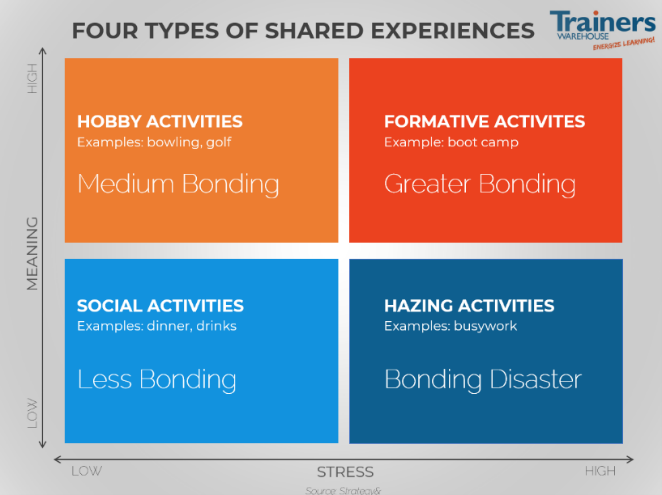From Team-Bonding Activities to Team-Building
Team Bonding Activities—a stepping-stone to Team Building
We’ve been neglecting team building. It hasn’t been on purpose. In fact, we’ve been trying hard to keep our teams together despite physical distancing and the absence of consistent day-to-day interactions. We’ve gotten together over Zoom meetings. spoken by phone, and been really creative when it comes to gathering for shared experiences. Thanks to companies like TeamBonding.com, groups have coalesced through virtual casino nights, online chocolate tasting experiences, building gingerbread houses, and cooking extravaganzas. It’s great. And, unfortunately, it’s quite not enough. We need to start moving from team bonding activities to team building activities.
 Three Critical Criteria for “Formative Activities”
Three Critical Criteria for “Formative Activities”
While bringing teams together in such creative ways enables us to enjoy one another and establish shared experiences, these activities are not necessarily helping us deepen relationships. As Augusto Giacoman, author of “The Serious Fun of Shared Experiences, warns, shared experiences are not all created equal. Shared experiences that are high-stress and meaningless (i.e. hazing), or stress-free and meaningless (i.e. cocktail parties), are unlikely to build trust, communication, or shared understanding.
For trainers then, our goal is to find “formative experiences”—meaningful activities, even if they do involve a bit of stress. We’re forever on the lookout for those perfect exercises that will both strengthen relationships and improve performance. Whether we’re forming teams, storming, norming or performing, our just-right experiences, must meet these three criteria:
- Flow-ful (Yes, I made up this word): Activities should transport players into a “flow” where they’re neither bored because the challenge is too easy, nor frustrated because it is too difficult.
- Low-stakes: Protected by the novelty of a “game,” we want exercises that allow teams to dissect, discuss, and learn, outside of real-life situations. While experiences ought to mimic real-life dynamics, they should eliminate the high-stakes stress.
- Review-worthy: The debrief or review is the whole reason to bother with team-building exercises. Playing the game is just the beginning. What we take away from the experience is all that matters. How does it help our teams learn about themselves and each other? Have we gained greater understanding of our group’s dynamics? Will our teams bond more closely and be more successful?
Team Building is Team Bonding with a Purpose
Beyond team building games that are flow-ful, low-stakes, and review-worthy, teams grow more cohesive when they unite to accomplish a shared mission or achieve a significant goal, like a charitable community development project or critical work initiative. But, even with perfectly orchestrated experiences and well-facilitated reviews, groups aren’t guaranteed to evolve into high-performing teams.
From Team Building to Team Performance
In 2012, Google’s Project Aristotle analyzed over 200 teams to determine the most critical elements contributing to team success. As much as they tried, they couldn’t attribute team success to cohesiveness, friendship, leadership, a mix of skills, process, or any of the other myriad of qualities they scrutinized. The only consistent element they found was the presence of “psychological safety”—the feeling that team members could say or do anything without fear of repercussions, judgment, or negative consequences. In other words, successful teams all created environments in which it was okay to be vulnerable.
Brené Brown, a guru on vulnerability research, finds that people are usually reluctant to share their vulnerabilities. This is especially true of work colleagues. Employees typically find it inappropriate or fear their position will be compromised. Ironically, when Brown asks her audiences to think of a time they felt vulnerable or weak, then asks how they would perceive another person in the same situation most consider others to be incredibly courageous.
The Role of Vulnerability and Psychological Safety in Team Building
The key to emotional bonding and developing strong teams is welcoming vulnerability and fostering psychological safety. Therefore, we must choose team exercises and conduct debriefs that allow people to share thoughts and feelings, challenges, and struggles. We need to ask the hard questions that develop trust and build emotional intelligence.
Team Building Activities and Debriefs that Welcome Vulnerability.
Some of my favorite team-building games for deeper debriefs include:
Colourblind, Jungle Escape, Leadout, Simbols by RSVP, Zin Obelisk, Murder Mystery, and Emergency Delivery Game. Each provides a rich experience, requiring good communication and listening, coordination, multiple roles, and process improvement. In a prior article, The Perfect Debrief for Any Learning Game, we used the “What? So What? Now What?” framework to structure meaningful debriefs for these sorts of games. To achieve deeper interpersonal understanding, however, we need to expand our repertoire of “so what?” questions. Here, we have an opportunity to expand conversations beyond the confines of the game and learn about the personal experiences that shape each team member. For instance:
- After identifying where the group got hung up and what they did when they struggled, say: Think of another difficult time of life. What did you do to change the situation? Who did you turn to for help? Or, If you saw someone struggling in a similar way, how might you help them?
- After discussing how a leader emerged in this experience, ask: in other aspects of your life, was there a leader who let you down? What happened and how did you respond?
- After asking what pushed the group out of their comfort zone, discuss: share another life experience in which you were pushed outside your comfort zone. How did it turn out?
From Team Bonding to Team Building
We shouldn’t dismiss team bonding. Often, team bonding activities contribute to the development of mutual trust and understanding, paving the way for more intimate conversations. At its best, team bonding will enable us to share our more vulnerable sides. Then we can take relationships to the next steps and explore the formative activities and vulnerabilities that will help us bond even more deeply.
Read More…
Building Relationships through Vulnerability


Very valuable